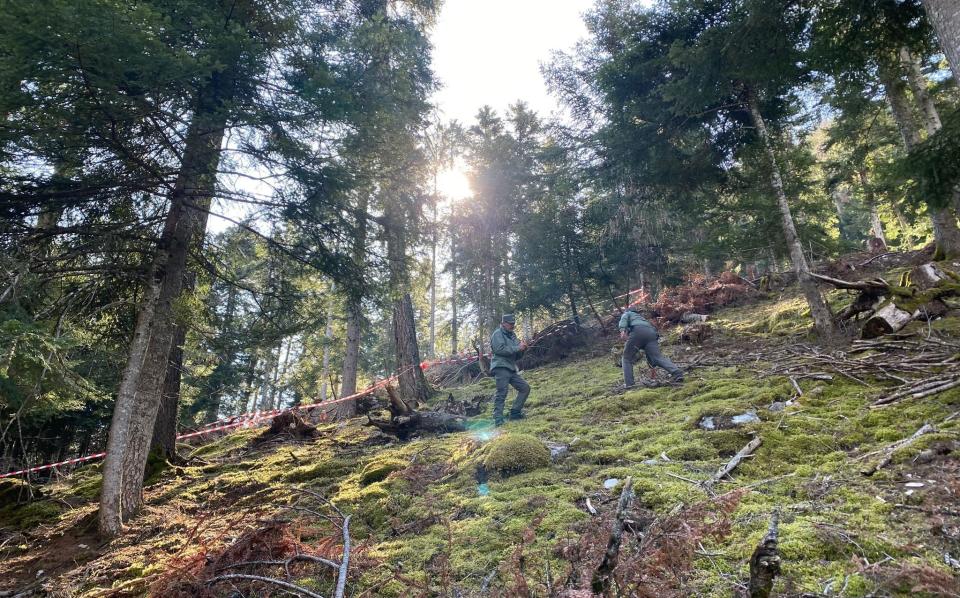Hunt for bear that killed Italian hiker in first case in the country

A bear that killed an Italian runner in the first fatal attack in the country's history is being hunted by local authorities via DNA samples left at the scene.
Andrea Papi, 26, went missing during a mountain run on April 5 near the village of Caldes in Trentino-Alto Adige, Italy.
The sports graduate was found early last Thursday with deep wounds to the neck, arm and chest after his girlfriend sounded the alarm when he didn't return home for a birthday party.
An autopsy published on Friday confirmed that he died in conflict with a brown bear.
Researchers are now examining DNA evidence including a bloodied stick that Mr Papi may have used to defend himself, according to Italian reports.
They are also collecting genetic material including animal droppings within a 500-hectre area to identify the wild animal.

The bear's identity is expected to be unveiled this week in order to aid the forestry workers’ search.
Maurizio Fugatti, the president of the province, has ordered a controversial “track and kill” order for three “problem” brown bears in the area that have been linked to attacks since 2020.
The bears are known as Mj5, which attacked a man in March; JJ4, which attacked a father and son in 2020; and M62, also known for intrusions into structures.
None of them had ever killed a human before last Wednesday.

Tributes have poured in for Mr Papi, a recent university graduate in physical education, whose motto on Instagram was “Till the top, never stop”.
Girlfriend Alessia Gregori said that Mr Papi was aware of the danger of bears and would often joke “let’s hope we don’t meet one”.
“What happened to him could have happened to anyone,” she said.
Antonio Maini, the mayor, announced a day of mourning for the funeral on Tuesday.
He also sent his condolences to Mr Papi's family, saying: “We are all shocked.
“To lose a young man in this way is scary. His death is a huge blow to his family and the community.”
Brown bears were reintroduced to the region from Slovenia between 1996 and 2004 as part of the EU Alpine repopulation project Ursus .

The population has grown from 10 to 100 but they haven’t expanded across the Alps as expected, choosing instead to stay in the Trentino region which has led to an increase in conflicts with humans.
Public support for the bear population has plummeted in the region and illegal culling has increased, according to Ursus.
Mr Papi’s mother, Franca Ghirardini, said the devastated family felt “anger and indignation” over the lack of proper management of the Ursus project in light of the growing bear population and repeated episodes of aggression.
In an open letter, Ms Ghirardini called for people living in the mountainous region to put pressure on the government to introduce safer habitats for communities to live side by side with the bears.
“Nothing was done,” she said. “Andrea was born and raised here, he loved nature and respected it, his territory, his peaks, his trails, were his life. I ask all those people who live in mountain regions to make your voices heard and not abandon us and not let your guard down, because I, and all my family, will fight until the end to bring justice to my Andrea.”
Looking for mushrooms
In 2014 a female brown bear known as Daniza mauled a man looking for mushrooms in the same region. The bear was euthanised during an attempt to capture it.
More recently, a brown bear nicknamed Papillon for its propensity for escaping from its enclosure was finally captured by rangers.
Ecologists and animal welfare groups in Italy have denounced plans to cull the bears and instead pointed to a lack of precautions.
Bears normally keep their distance from people but can become aggressive when surprised, chased by dogs or with cubs.
Critics have also called for more educational awareness about what to do during a bear encounter.
In grizzly country hikers are urged to wear bells to announce their presence, but if they do encounter a bear they are urged to stay still or back slowly away, and if attacked, drop into foetal position and cover their head.

 Yahoo Sports
Yahoo Sports